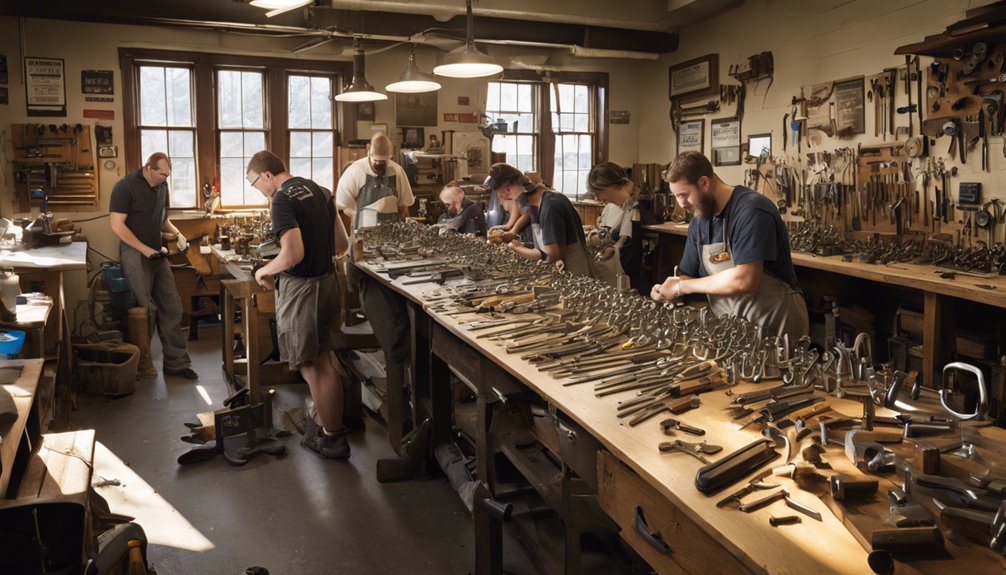You might not realize that Pennsylvania doesn't require a state license for locksmith apprenticeships, but there are still specific guidelines you need to follow to get started. Understanding the eligibility requirements and finding the right training options can greatly impact your journey. As you explore these facets, you'll find that local resources play an important role in shaping your career. What you discover could be the key to successfully traversing the locksmithing landscape in the state, making it essential to know what's required and available.
Key Takeaways
- Apprentices must be at least 18 years old and possess good moral standing, although a criminal record may not disqualify them.
- Basic math skills and familiarity with locksmith tools are required for apprenticeship eligibility.
- Apprenticeships can be found through local locksmith businesses, trade associations, and vocational schools.
- Apprenticeships may be unpaid or stipend-based, focusing on hands-on experience in locksmithing.
- Employers must register their apprenticeship programs with the Department of Labor & Industry in Pennsylvania.
Eligibility and Requirements

To qualify for locksmith apprenticeships in Pennsylvania, you must meet several eligibility criteria. First, you need to be at least 18 years old. While there's no formal degree or certification required, demonstrating a good moral standing is advisable, though a criminal record won't automatically disqualify you. It's also crucial to possess a sound mind, which is a universal requirement for all prospective apprentices. In addition, you should have mechanical ability and basic math skills, along with familiarity with locksmith tools. These skills are critical for your successful performance in the apprenticeship and eventual career.
Employers must develop an apprenticeship program that includes clear training and instructional guidelines. This program needs to be registered with the Department of Labor & Industry and receive approval before you can begin your training. Many employers prioritize hands-on experience to ensure that apprentices are prepared for the demands of the job. Furthermore, obtaining a locksmith license in Pennsylvania can enhance your professional recognition and compliance with state regulations. Continuous learning is essential in this field to remain competitive and up-to-date with industry advancements and trends.
Once established, the program must be maintained according to approved standards. If you're seeking apprenticeship positions, make sure to consult the PA CareerLink® employer page for resources regarding this process. As an apprentice, you'll gain valuable hands-on experience, although this may be unpaid or provided with a stipend. Your recruitment and selection will follow specific policies designed to guarantee you meet the conditions of employment and training throughout your apprenticeship.
Keep in mind that while there's no state licensing requirement for locksmiths, self-employed locksmiths do need a business license, and obtaining liability insurance is strongly recommended to safeguard against potential liabilities.
Training and Education Options

Numerous training and education options are available for aspiring locksmiths in Pennsylvania, ensuring you gain the necessary skills and knowledge to succeed in the field. You can choose from various formal training courses, including specialized locksmith schools or online programs like Penn Foster and Stratford Locksmith Training. The Associated Locksmiths of America (ALOA) offers valuable courses, such as a six-day fundamental locksmith training course. Additionally, many programs include business ownership details alongside locksmith skills, emphasizing the importance of professional conduct in establishing a successful career. Remember that operating as an unlicensed locksmith in Pennsylvania can lead to significant legal penalties, so obtaining the necessary credentials is crucial.
Consider obtaining industry-recognized certifications to enhance your credibility. Options include Certified Licensed Locksmith (CLL), Certified Registered Locksmith (CRL), Certified Professional Locksmith (CPL), and Certified Master Locksmith (CML). Pursuing certifications such as Certified Professional Safe Technician can further expand your qualifications and networking opportunities within the locksmith community. Higher certifications demand more schooling and experience, emphasizing the significance of continuous education to keep pace with evolving security technologies. Locksmiths in Pennsylvania are subject to specific employment laws, which outline their rights and responsibilities and aim to ensure fair practices within the industry.
In addition to formal education, it's essential to gain hands-on experience. Apprenticeships allow you to work alongside professional locksmiths, providing practical skills crucial for the trade. You can seek apprenticeship opportunities through locksmith companies, hardware stores, or emergency roadside assistance providers.
These experiences not only enhance your hands-on skills but also help you build industry connections that could lead to future employment or business opportunities.
For continued growth, participate in seminars, training events, and manufacturer training sessions. Staying updated with legislative changes and advancements will keep your skills relevant in this dynamic industry. By exploring these training options, you'll be well-prepared for a successful locksmith career in Pennsylvania.
Overview of Apprenticeship Programs

In locksmith apprenticeships, hands-on experience is essential for developing your skills effectively. You'll want to find suitable programs that offer a balance of practical training and classroom instruction. This approach not only enhances your learning but also prepares you for successful career opportunities in the locksmith industry. Pennsylvania law emphasizes the importance of preventive measures, such as proper installation techniques, to minimize locksmith liability in the event of break-ins. Understanding the legal aspects of key duplication in Pennsylvania is crucial, as it ensures compliance with state laws regarding permissions and restrictions. Additionally, consider exploring apprenticeship opportunities that provide access to over 100 classes offered by ALOA at conventions and regional events, which can further bolster your training.
Importance of Hands-On Experience
Hands-on experience is an indispensable component of locksmith apprenticeships, ensuring that trainees develop practical skills essential for success in the field. During your apprenticeship, you'll engage in key cutting, lock installation, and emergency lockout assistance, allowing you to become proficient with both mechanical and digital lock systems. Working alongside experienced locksmiths will provide you with invaluable mentorship, offering feedback as you gradually take on more responsibilities. In this role, you'll also apply theoretical knowledge through real-world scenarios, honing your problem-solving skills and understanding of security systems and legal considerations. Interacting with customers is another significant aspect; you'll learn how to explain technical information clearly, build trust, and ultimately enhance customer satisfaction. Moreover, you'll gain experience in advanced skills like creating master key systems and programming electronic access control systems, ensuring you're prepared for various challenges in the field. This immersive experience not only equips you with the technical expertise to excel but also keeps you updated with the latest security technology advancements. By completing your hands-on training, you'll be well-positioned to thrive as a competent locksmith, ready to serve your community. Additionally, being aware of the essential safety standards for locks in Pennsylvania is crucial to ensure legal compliance and enhance security measures for both residential and commercial properties. It's important that your security measures meet the high-security lock standards required in Pennsylvania businesses, which will help maintain state guidelines.
Finding Suitable Apprenticeships
Locating suitable locksmith apprenticeships is an essential step in launching your career in this field. You can explore various sources for finding apprenticeships, including local locksmith businesses, hardware store owners, and emergency roadside assistance providers. Additionally, trade associations like ALOA and SAVTA, as well as vocational schools offering locksmith training programs, can provide valuable leads. The structure of these apprenticeships usually entails unpaid or stipend-based positions where you gain hands-on experience under the guidance of experienced locksmiths. You'll engage in a combination of theoretical and practical training, exposing you to various lock types, including safes, vaults, and auto locks. This real-world experience often leads to future employment opportunities with the same company. During your apprenticeship, you can expect to develop essential skills such as mechanical and mathematical proficiency, alongside familiarity with locksmith tools and equipment. In Pennsylvania, lock picking is generally permissible for locksmiths as long as it is not used for illegal activities. Key-making, lock installation, repair, and inspection will be part of your training. In addition, consider pursuing certifications like CLL, CRL, CPL, or CML and participating in industry seminars to stay updated on the latest security systems and technologies. Locksmiths play a vital role in foreclosure processes, particularly in states like Pennsylvania, where they have specific legal responsibilities. Joining trade associations will provide you ongoing education and support relevant to your growth in the locksmith trade.
Benefits of Practical Training
Participating in an apprenticeship program offers you practical training that equips you with essential locksmithing skills necessary for success in the field. Through hands-on experience, you'll master key cutting and duplication techniques, enabling you to efficiently produce precise keys.
You'll learn to install, repair, and maintain various lock types, including mechanical and electronic systems, ensuring you're prepared for diverse client needs. Additionally, understanding the requirements for ADA compliance regarding locks and security systems in Pennsylvania is crucial for ensuring accessibility for all clients.
Emergency lockout situations can arise at any moment, and your training will involve effective response strategies using the correct locksmithing tools and equipment, such as lock picks and key cutting machines. This practical training also provides a deep understanding of lock mechanisms, enhancing your troubleshooting abilities.
Beyond technical skills, you'll develop crucial customer service competencies, learning to communicate complex information clearly. Advising clients on security solutions not only enhances their trust but bolsters your professional development.
Moreover, safety protocols and legal regulations surrounding locksmithing are integral parts of your training. Continuous education, including voluntary certifications from professional organizations, will further enhance your credibility, ensuring you remain atop the latest advancements in the locksmithing field.
Locksmith Pennsylvania offers 24/7 emergency services, providing real-world opportunities to apply these skills under time-sensitive conditions.
This multifaceted training sets you up for lasting success and independence in your locksmithing career.
Starting Your Locksmith Business

As you initiate starting your locksmith business in Pennsylvania, understanding the regulatory landscape is essential for guaranteeing compliance and establishing a strong foundation.
In Pennsylvania, there's no state license specifically required for locksmiths. However, if your annual earnings exceed $5,000, you'll need to obtain a Home Improvement Contractors license, which involves:
- A $50 fee for a two-year license
- Proof of proper insurance
- A physical mailing address
This license is processed through the state's Attorney General, and while there's no mandatory certification, pursuing training through trade schools or online courses is recommended to enhance your qualifications. Apprenticeships can provide invaluable practical experience, too. Locksmiths should also be acquainted with the regulations affecting digital locks to stay informed in this evolving field.
To ensure compliance during eviction procedures, locksmiths must be aware of the legal framework governing evictions in Pennsylvania.
You can set up your locksmith business with minimal investment. Consider these operational avenues:
- A physical storefront lockshop
- A mobile locksmith service, which can be run from a converted vehicle
- Necessary equipment like key cutting and automotive key programming machines
Advertising is critical; leverage online platforms as well as local communities to attract customers.
While Pennsylvania doesn't impose specific state insurance requirements for locksmiths, maintaining appropriate coverage, especially for a Home Improvement Contractors license, is prudent.
Lastly, verify you comply with general business regulations, which may include registering with local authorities and obtaining a Workers' Compensation Certificate.
Benefits of Trade Associations

Membership in trade associations offers locksmiths a wealth of opportunities to enhance their professional practice and stay at the forefront of industry developments. By joining an association, you gain access to invaluable networking opportunities where you can connect with other professionals in your field.
Attending conferences and events allows you to share knowledge, participate in workshops, and collaborate with peers to tackle industry-specific challenges.
Staying informed about changes in laws and regulations is essential for any locksmith. Trade associations keep you updated on state and local law modifications, ensuring your business remains compliant with the latest codes and licensing requirements.
This support is vital when maneuvering potential legal hurdles, making your operation more efficient and secure.
Moreover, trade associations often provide mandatory continuing education courses important for compliance and professional growth. Membership opens doors to various training formats such as seminars, webinars, and home study programs, equipping you with the skills needed to thrive.
You'll also benefit from certification programs that validate your expertise, enhancing your professional credibility.
Being part of an association not only elevates your standing in the community but also offers peace of mind to customers hiring your services. Members gain access to industry publications and newsletters that keep you informed of new practices and standards.
Ultimately, trade associations empower you to excel within the locksmith industry, enhance your business practices, and build a solid professional network. Additionally, being part of a top-rated nationwide network of certified locksmiths can further enhance your credibility and expand your client base.
Importance of Continuing Education

Continuing education is imperative for locksmiths who want to stay competitive and effective in a rapidly evolving industry. With technology advancing at a fast pace, you need to keep your skills sharp and your knowledge current. By prioritizing ongoing learning, you'll guarantee you're well-equipped to handle the demands of the market.
Here are some key reasons why continuing education is essential for your locksmith career:
- Stay Updated with Technology: Familiarize yourself with new locks and vehicle keys, as regular developments in security hardware require continuous learning.
- Enhance Skills and Knowledge: Apprenticeships and certifications, such as CLL or CRL, can considerably boost your employability and technical know-how.
- Comply with Industry Standards: Adhering to state and local regulations is critical for maintaining your professional reputation and integrity.
Attending industry seminars, workshops, and conventions allows you to stay informed about the latest compliance requirements and ethical practices.
Training programs offered by locksmith schools and trade associations provide important updates you can't afford to miss.
Furthermore, certified locksmiths often enjoy better job prospects and higher earning potential. By investing in your education, you're not just keeping pace with industry developments; you're positioning yourself as a trusted professional.
Ultimately, continuing education serves as a robust foundation for long-term success and profitability in the locksmith field.
Frequently Asked Questions
How Long Does an Apprenticeship Typically Last in Pennsylvania?
An apprenticeship in Pennsylvania typically lasts between 1 to 6 years, depending on the trade and its specific requirements.
Each year, you'll complete 2,000 hours of on-the-job training, which is a standard benchmark across many programs.
Additionally, you'll engage in 144 hours of related technical instruction annually.
This structured approach guarantees you gain both practical experience and necessary knowledge to excel in your chosen trade.
Can I Apprentice While Working a Different Full-Time Job?
Yes, you can apprentice while working a full-time job, but it's challenging.
Balancing both commitments may require flexible scheduling from your employer or finding a part-time apprenticeship. You'll need to prioritize your time effectively, as apprenticeships demand a significant commitment.
Openly discussing your apprenticeship plans with your employer can help create a supportive arrangement.
Ultimately, while it's feasible, be prepared to manage your time wisely for both roles to succeed.
What Types of Locksmithing Specialties Can I Pursue?
You can pursue various locksmithing specialties that cater to different needs.
In residential locksmithing, you'll install and repair locks for homes.
Commercial locksmithing focuses on securing businesses with advanced systems.
If you're interested in vehicles, auto locksmithing involves opening car doors and programming keys.
For those keen on safeguarding valuables, safe and vault locksmithing focuses on installation and maintenance.
Each specialty offers unique challenges and opportunities that allow you to expand your skills and services.
Are There Age Restrictions for Apprenticeship Applicants?
Just like a key fits a lock, unfastening your potential as an apprentice hinges on age requirements.
Generally, you'll find minimum age recommendations start at 18, though some programs may accept younger applicants.
Employers hold the reins, setting their own age limits.
While there's no universal age restriction, it's wise to check specific program details and local employer preferences.
Your journey into locksmithing can begin with understanding these nuances.
Is There a Fee for Joining Apprenticeship Programs?
There aren't any specific fees mentioned for joining apprenticeship programs.
However, you might encounter costs related to licensing or background checks, depending on your situation. Some employers could cover these costs, which can include training or certification fees.
It's important to inquire with your prospective employer about any specific expenses you may face. Always check to make certain you have a clear understanding of potential financial obligations before committing to an apprenticeship.
Conclusion
In Pennsylvania, you stand at a crossroads: opting for hands-on experience through an apprenticeship or diving into the challenges of starting your own locksmith business. By joining reputable trade associations, you'll gain both support and resources, fostering your growth in a competitive field. Continual education solidifies your skills, ensuring you stay relevant amidst evolving locksmith technologies. Ultimately, your journey as a locksmith involves balancing practical training with ongoing development, transforming ambition into expertise.









